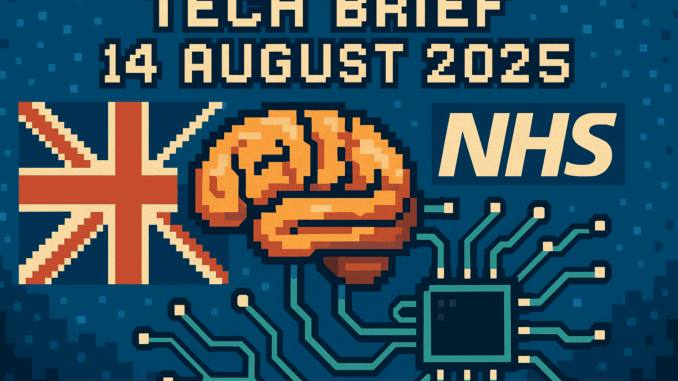
Tech Brief 14 August 2025 brings together NHS brain implants, transparent headphones, and the latest privacy debate, all unfolding in the UK’s digital landscape. Technology history remains as unpredictable, and as British, as ever. Missed yesterday’s Tech Brief? Catch up here before diving in.
Newcastle NHS Trust to Trial Neuralink Brain Implant
A brain implant trial, led by Newcastle Hospitals NHS Trust and Elon Musk’s Neuralink, starts this month in the North East. This NHS-backed project will test whether Neuralink’s direct neural interface can safely support patients with severe neurological conditions in Britain. For reference, “neural interface” describes any device linking computer hardware directly to the human brain, something that once belonged to the cyberpunk fiction you read before your dial-up connection could even show the first line of text. It is rare for such major innovation to debut outside London. Newcastle’s role as a regional tech leader feels earned, not manufactured. Expect classic questions about ethics, consent, and whether the next reboot will require actual brain surgery. Is the future just faintly Geordie-accented now?
Nothing Headphone 1 Review: Transparent Design, Retro Feel
“Why did everything nice become opaque?” That’s a reader comment under Nothing’s new Headphone 1 review, and honestly, it nails the mood. These headphones, from London startup Nothing, revive the see-through trend with LED displays mimicking 90s pixel charm and proper physical buttons, evoking 1990s gadget glory days without pretending it was all perfect. Reviewers highlight easy repair, solid comfort, and pure visual nostalgia. Repair guides from iFixit already list decent scores, so your kitchen table toolkit will finally get a modern workout. It is interesting to see how younger designers tap into the “retro future” look with clear plastic, tactile switches, and even fonts channeling cassette culture. If every pair sparks memories of Argos catalogues, maybe that’s a good thing.
Cooper Defends Facial Recognition Expansion Amid Privacy Row
Facial recognition cameras, once limited to airports and fiction, are set for more widespread deployment across the UK. Home Secretary Yvette Cooper says new laws will keep things “safe and fair”; but data rights groups remain worried. “It’s just another database until it starts making decisions about your life,” says one privacy veteran in the SNUG forums, a callback to debates that filled Usenet and digital society listservs decades ago. The current policy push aligns with broader European and US trends, yet UK implementation remains uniquely rapid and public-facing. How do you balance safety with surveillance, especially when so much of the technology is invisible and untested in everyday life? This story is still developing, and distrust is far from gone.
From the Wayback Machine
On This Day: 1969 – BBC1 and ITV Launch Colour TV Broadcasts
On 15 November 1969, BBC1 and ITV began regular colour TV broadcasts across the UK using the PAL system for higher fidelity. Only about half of homes received colour signals at launch, but within ten years millions had upgraded sets and paid for the more expensive £10 licence. Behind the scenes, studios refitted, engineers retrained, and every live show adapted for colour production. The PAL launch marked Britain as a leader in broadcast technology, not just catching up but innovating on the global stage.
Today’s Big Question
What part of today’s news would you be most proud or nervous to explain to your 1979 self: Neuralink’s brain interface, transparent plastic headphones, or blanket street surveillance?
Stay curious, and keep at least one circuit diagram where your WiFi password used to be. The past has a way of becoming relevant faster than you expect.
Curious about how yesterday’s headlines set the stage? Read the previous Tech Brief.

Leave a Reply